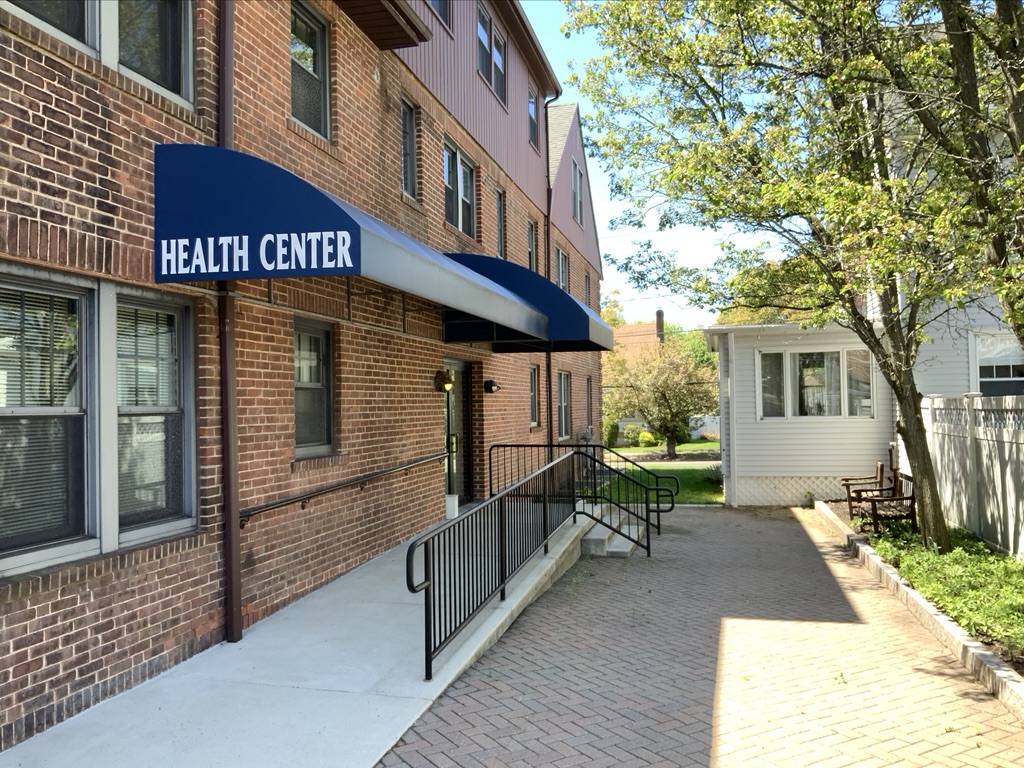
Despite Choate’s closing this term, the Health Center has continued to support students virtually. Photo by The Choate News
Throughout the ongoing Covid-19 pandemic, Choate’s Health Center has invested a great effort into supporting the health of the Choate community.
The Health Center continues to provide healthcare for students despite their absence from campus. Dr. Miriam Cohen, Medical Director of the Health Center, said, “The great part of electronic medical records and electronic medication prescription is that I don’t need to use a piece of paper anymore. I can send a prescription anywhere in the United States. [The students] can just go to the pharmacy of their choice and pick it up.” In addition, the Health Center has also begun to connect students with local primary care providers.
“While we’re at Choate, we take care of things for kids on campus,” said Ms. Karen Klein, the Director of Nursing at the Health Center. “When we’re not in school, it means trying to get kids reconnected back to services. We’ve also been able to reach out to kids and check in with them. For example, we’ve gotten some feedback from kids who might want to start seeing a new counselor.”
The Health Center is also striving to connect with student groups, such as the Peer Educators, Wellness Committee, and Assessment Team, in order to reach out to the Choate community and spread useful information concerning health.
“The Peer Educator group is a great fit with the Health Center,” said Ms. Klein. “We’ve been working together to identify some of the issues that are affecting kids right now and to look at ways we can reach the broader community. Some of the issues we’re planning to address over the next few weeks are coping with family relationships at home and self-care at home.”
The Health Center has also paid attention to the increased stress that isolation has placed upon students, which may lead them to harmful habits like vaping.
“Vaping is a big problem for a lot of our students, and we want to provide information for kids on how to identify if you might be getting addicted to vaping. It actually can happen very quickly because the nicotine level in vapes is very high.,” said Ms. Klein.
With this problem in mind, the Health Center has worked with Peer Educators to create confidential text quitlines. By texting “QUIT” or “DitchJUUL,” students can be connected with medical providers and counselors to receive confidential help.
The Health Center is also working with the Eight Schools Association and the Westminster School to discuss interscholastic problems that have arisen due to the pandemic and strategies to handle those problems.
“We are talking about all the issues associated with Covid, both for opening our schools in the fall and how we can all work together to make this happen and support each other, as well as how we support the students,” said Dr. Cohen, who attends meetings with the association twice a week.
“We’re talking about, ‘What problems are your students having? How are you approaching those problems? How are you providing them help?’ Then I can bring that back to Choate, and we talk about it in our Health Center group, and we try to then take that to the next step.”
Beyond the Choate community, the Health Center has also directed its attention to collecting and donating personal protective equipment (PPE) to first responders, providers, and hospitals in the state of Connecticut.
Although the Health Center has put in its best effort to continue providing support for students, the physical closing of the Health Center has, of course, had its drawbacks. The planned installation of a student-led art exhibit in the building has been delayed, and the move to virtual platforms has resulted in the loss of valuable in-person communication.
Dr. Cohen said, “Although there is benefit to [virtual communication], it’s not the same as sitting one-on-one and talking to students and being able to make true eye contact. I think it affects care in the ability of our interactions. My fear is that they are not as of high quality just because we are not in the same room, and it’s not the same feeling.” The Health Center hopes to continue providing information and support despite the challenges of an exclusively virtual system. Dr. Cohen commented, “Sometimes it’s hard for us to know exactly what’s needed by the students. If we haven’t thought of something that we could do to help you guys, then please reach out to one of us and share some information so we can make that happen.”


